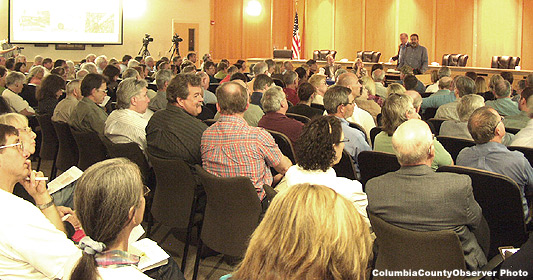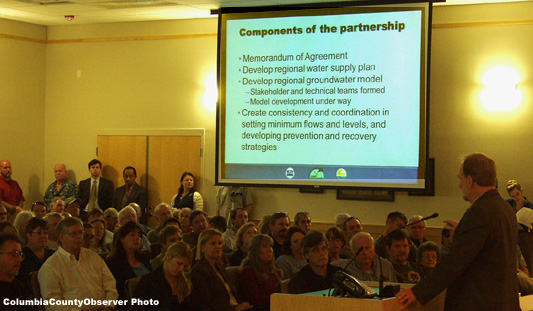N FL Regional Water Supply Partnership: The controversy continues – Who will be the right stakeholders in the tent?
Posted March 08, 2012 11:14 am

In was a packed house in Alachua City Hall last night as
folks came from throughout the region to be a part of
the conversation in the future of their water.
By Stew Lilker
ALACHUA, FL – Last night the first public meeting hosted by the North Florida Regional Water Supply Partnership kicked off to a packed house in Alachua City Hall with folks still lined up and signing in fifteen minutes after the meeting began. A crowd in the hundreds came from all over in a show of force, which should have told the Water Supply Partnership that they weren't happy with the stewardship of their water. Ann Shortelle of DEP said they were listening, but were they?
On September 13, 2011, the St. Johns River and Suwannee River water management districts and DEP entered into an agreement that formalized the coordination of water resource management in North Florida.
Until recently, this triumvirate did little to advise the region of its existence. It was only after the SJRWMD approved a 155 million gallon a day consumptive use permit that folks really began shining the light on the water policies of the two water management districts that are responsible for the drinking water and water management in 33 Florida counties beginning at the Georgia border and working south.
Ann Shortelle with DEP, the Director of the Office of Water Policy, introduced herself and told the packed house, "We don't want to speak too long. We want to open it up and hear what our stakeholders have to say."
Before the stakeholders had their chance at the microphone, the water management districts introduced the Water Supply Partnership and gave an overview of what it has been doing since last September.
Charlie Hauder, Assistant Executive Director of the SRWMD told the gathering, "You're here because you understand the importance of these water issues. I don't need to tell you how important water is to our environment; to our economy; to our health and well being. You guys have got that."
Mr. Hauder continued, "Water here in the state of Florida is a shared resource. It is something that belongs to all of us and we all have a stake in its ownership and in its management. The responsibility for providing stewardship for that resource lies with the water management districts and with DEP, but with the involvement of the local elected officials throughout the region and also every stakeholder we see represented in this room."

SRWMD's Charlie Hauder explains the "components of the
partnership."
Who are the "right stakeholders in the tent?"
Hans Tanzler, Executive Director of the SJRWMD carried on the theme of local involvement in the process. "One of the things we want to do tonight is kick off the idea of having a community stakeholder group be part of our joint collaborative process... The stakeholder group is really an advisory committee. We want it to have as much balance as possible. To that end we will have ideas about representatives of different stakeholders – different industries -- that may be interested in giving this balanced input... the stakeholders will influence and persuade... That is, I think, part of the outreach and part of the inclusion of the right stakeholders in the tent."
Mr. Tanzler named the areas from which each district will appoint a representative: public water supply; power generation; industrial mining; agriculture; environmental groups; and local government.
He said, "The effort is to get a cross section of our constituency – to have a balanced input... The members of the two groups will be appointed by the two districts with the supervisory role of DEP."
The stakeholders
The stakeholders came one after another to the microphone.
Lafayette County Commissioner Jack Bird: We need to get control of the water management groups. All of the public needs to have a say where our water is being sent and used.
Lucinda Merritt: She named a long list of springs "that have dried up or are so polluted that frequently they can't be used by the public." "It is clear to me that our water management districts have failed our springs. The DEP has failed our springs and I am hopeful that with this new group that things will start to be different."
Tony Cunningham, Gainesville Regional Utilities: He gave the corporate point of view with a twist. He said he represents GRU and the citizens he serves. "Part of the long term plan for water supply is the importance of using less water... All stakeholders can come together."
Whitey Markel, Conservation Chair, Suwannee – St. Johns Sierra Club: We try to take care of 15 counties in this part of Florida. The idea about amalgamating into regional water control leads me to believe that we are going to amalgamate into what they call the Californication of Florida, where we will eventually have a big grid of pipes and nobody will have any more water than anybody else, although some parts of the state have already overused their water.
David Dickerson, Water Collectives: I think the advisory committee is a good idea. It probably won't turn into an amalgamation of water pipes. I'm in the nursery business. I know Hans [Tanzler] personally.
Merelle Malowitz-Jipson, Our Santa Fe River: I'm very concerned about recharging our aquifer with treated waste water. She said waste water contains arsenic and other chemicals and will end up in our springs and our rivers.
Tim Williams, Suwannee Progress: "Why isn't tourism included as one of your seats on your committee? Tourism is dramatically important to all of North Florida."
Jackie Host, Lake Area Water Alliance: "There is a lot of science out there. We need to consider everything. We need to come together in the true sense of partnership."
Annette Long, Save Our Suwannee, Inc.: "I came to this meeting tonight to ask the water management districts and the DEP – What don't you understand about our springs are drying up... It sounds like they do understand that we do have a problem." She said she wants a seat on the stakeholder group.
Jim Lloyd, resident who lives along the river: I represent a group of residents who live full time on the river. I'm not sure I saw a stakeholder that represents the average guy or gal.
Bob Barneth, Vice Mayor of High Springs: Said that when he was a citizen no one would listen to him and that the SRWMD and DEP seemed not to want to talk to each other. He advised the districts and DEP, "When a citizen brings you something, they might be telling you the truth."
Lee Chauncey, citizen of Suwannee County. He said he was a candidate for County Commissioner: The issue that I am encountering is one of trust. (Looking at the DEP and water management's representatives) They don't trust you and they've told me they are not going to trust me if I get elected and I don't blame them. Referring to the list of stakeholders he said, "You need a category on here for the homeowner... If you want to work on this trust issue, get the common people involved in this."
The Stakeholder Selection Process
Folks were not comfortable with the stakeholder application/selection process.
Questions like "Are the applications going into a hat?" and "What are the criteria for selection – If you like them?" were asked.
DEP's Shortelle said, "Each water management district will evaluate their own applications."
Ms. Shortelle was not particularly familiar with the stakeholder application that was handed out.
The Observer asked Ms. Shortelle that if after listening to the comments would the Water Working Group's list of stakeholders be subject to expansion.
An audience member asked again if tourism and homeowners would be considered.
DEP's Shortelle responded, "General home owners don't get consumptive use permits."
The audience laughed and rumbled. One audience member asked, "You try to drill a well lately?"
After a few moments, Ms. Shortelle told the group, "We'll take it under advisement."
Epilogue
"The right stakeholders in the tent" for them?
In a brief conversation with a local public official it appears the calls may already be going out by the water management districts encouraging friendly stakeholders to apply for a seat at the table. Remember, it is the water management districts, with the blessings of DEP that are selecting those members.
If the Water Working Group is interested in removing the "appearance of impropriety" and having a fair and impartial selection process, they should draw up a slate of stakeholder groups from the applications and have those stake holders decide who would best represent them in their particular group.
In the age of the internet, this would not be a difficult process.
The only downside could be that the triumvirate of the SRWMD, the SJRWMD and the DEP, not the poster children for trust, would not be able to hand pick in Hans Tanzler's words "the right stakeholders in the tent."
